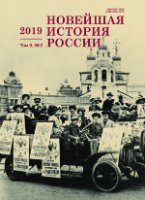Концепт «мужество» в воспоминаниях ветеранов локальных войн: на стыке устной истории и феноменологии фронтового опыта
The Concept of “Courage” in Memories of Veterans of Local Wars: The Intersection of Oral History and Phenomenology of the Front-line Experience
Author(s): F. V. Nikolai, A. A. MordvinovSubject(s): Anthropology, Gender Studies, Military history, Oral history, Social history, Identity of Collectives, Peace and Conflict Studies
Published by: Издательство Исторического факультета СПбГУ
Keywords: oral history; narratives; veterans; local conflicts; courage; dignity; masculinity;
Summary/Abstract: This article analyzes the limits of existentialist and constructivist strategies of interpreting the front line experience. Phenomenological descriptions of that experience are , presented in semi-formalized interviews, collected by the authors in 2013–2018. Responsibility and solidarity are at the center of veterans’ normative representations of courage. But it is important to note that during interviews, this normativity enters into complex and contradictory relations with incidents that do not fit the general framework. On the other hand, these contradictions are superimposed on the difficulty of relating perceived attitudes and un-reflected habits. As a result, during the conversation, the role of the cliche is significantly reduced, and attention to bodily practices, on the contrary, grows. In this context, opposing the existential attitudes and socially fixed “collective memory” of veterans is not effective. More promising is the clarification of a narrative self-identifications whose functions aimed at maintaining status/ dignity and the search for adequate forms of expression of the front-line experience. The difference in the views of combatants and official army rhetoric indicates a serious strain caused by the proliferation of tactics of subjectivization of participants of the “new wars.” In this sense, the military machine works, constantly breaking down. And the task of military-historical anthropology is to identify these faults: the discrepancy between the narratives of politicians and soldiers; participants in hostilities in Afghanistan and the North Caucasus; the distinction of irony and romantic metaphors; the discrepancy of the competitive tactics of the “culture of war”; and to offer combatants alternative ways of expressing front-line experience (without replacing their choice with a new set of prepared cliches).
Journal: Новейшая история России
- Issue Year: 9/2019
- Issue No: 27
- Page Range: 515-525
- Page Count: 11
- Language: Russian

